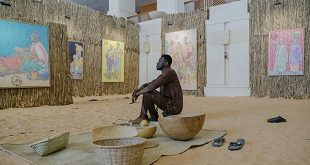
By Mukama Miriam
A visit to Mulago Hospital mortuary shows a mortician’s attempt to cope with his loss
The woman lying on the metallic slab was about 60 years old. Her skull was bare, and white with hints of her blood. The skin that normally covers the skull had been pulled away and was hanging firmly in front of her face like an iced-visor. The pathologist had drilled a round hole, the size of a tea cup, in the back of her skull and pulled out her brains for the postmortem. Water was running through the gaping black cavity in her dead skull.
I had never seen a naked dead body until I walked through the door with the green inscription Do Not Enter at Mulago hospital mortuary. I had braced myself to see a dead body. I had not imagined that I would find several scattered all over the place.
Immediately in front of me was the woman, there, her naked body lifeless, frozen, on the metallic slab. Her chest too had been cut open to expose her rib-cage and water was flowing through it as it underwent a postmortem. The facial skin had been pulled over and her skull cut because medical doctors do this to establish the cause of death.

But if this sight was bad, the next was macabre.
Six bodies of different sexes, different ages and sizes lay on the metallic post mortem beds and two others on the floor. “Do some have to be naked?” I asked myself as I pictured how while still alive, they must have been willing to give up anything to hide their privacy.
But here they were, naked for everyone to see.
I had heard tales of how, when you come looking for your body, the morgue attendants keep pulling out different bodies for you to pick yours, since they do not have tags.
I imagined a young girl having to deal with the sight of a naked body of her father or grandfather or a young boy, his grandmother.
After death
I have always known that there are two most important occasions in a human being’s life. When they are born and when they die. At birth, the feeling is of joy, they are an addition to the world. But when they die, I had always imagined, the emotion is even stronger. That the dead are respected and feared and everyone wants to treat and say only good things about them since it is their last moment on earth. Not at Mulago mortuary.
The picture here made me wish that I or anybody never has to go through this. Unfortunately, on average, ten bodies are brought in for postmortems daily, and about 150 post mortems are performed annually.
The floor of the mortuary is filthy, the water used to wash the bodies flowing past the bodies, and mingling the sharp stench that cuts through the nostrils. To the mortuary attendants it was business as usual. They live with death. One man particularly cut an image of a butcher; it is just that he didn’t have a machete.
With white, blood-stained boots, he was stamping past me when he noticed the fearful look in my eyes.
“Don’t worry,” he said, “this is how I look after carrying out a postmortem.”
His voice was sharp and cold. It seemed nothing bothered him, not even the stench. I could well imagine him sorting the bloody body parts specimen and arranging them in the cut water bottles for the pathologists to check for cause of death.
“I have done this for a long time,” he said, “I have been in many strange situations but there is no turning back. You get used with time. The night shifts are even worse.”
A question of survival
As I looked around, standing in the middle of the mortuary, I noticed a mortician who looked buried in thought. When our eyes met, I gathered my already blown away courage and approached him.
Clad in a red t-shirt and a brown trouser, he too looked cold but there was something about him, he looked empathetic, like he understood what I was going through. Little did I know that the poor soul was experiencing the worst moment in the 21-years he has been working here.
Morgue attendants are people trained in handling the dead. At Mulago, they are known as morticians. Particularly a mortician is different from a morgue assistant even though they all play a role in giving the deceased a good send off. But it makes no difference to them.
It certainly takes extreme courage to work in this mortuary. This mortician told me he took the job because of an urge to treat the dead respectfully. He also needed a means of survival.
He says the first day he visited a mortuary, a merciless mortician, who could see that they were in shock, pulled out body after body from the cold-storage.
“Is this one yours, is this one yours?” he recalls his tormentors words.
He knew that when people die, although they are unaware of what is happening, they are respected and feared. The bereaved always want to give the deceased the best moment in a send off, their last moment on earth.
But he recalls that the young man, who looked drunk, just kept pulling out the frozen bodies “as if they were stones”.
“That is how the unprofessional ones handle people,” he said.
He attributed this to distress and mental torture that people who become morticians without training or studying a pathology or mortuary course face.
I concluded that this gentleman had taken a mortuary course. Why then is he called a mortician instead of morgue attendant?
In some ways, this is not shocking, because both morgue attendants and morticians deal with the same thing, the human body. However, it is not very hard to understand. The job involves cleaning and cutting through the bodies on these scary metallic slabs in this small, stinking mortuary which, if it was located on the ground floor of one of the storied buildings, would have to deal with vultures.
Losing your loved one
Morgue attendants assist pathologists in carrying out postmortems under strict supervision. Even medical experts who have not studied it refer to the job as disgusting and scary.
But the next thing this mortician told me made me feel his pain.
“As I am talking to you right now,” he said and posed, on looking into his eyes, they had turned red and teary. “My sister is lying dead in this same mortuary. It becomes worse when you lose your own; this is when you feel the worst pain of your profession.”
His sister, he told me, died due to over bleeding during child birth. The baby was saved. It was a consolation, he said.
Medical experts say that morgue attendants’ lives are often at risk since they deal with lifeless bodies of every disease and complication.
Yet morticians here are paid very small salaries. “How I wish the government would understand the nature of our job, and try to increase on our allowances,” the mortician said, “I have two children and wife to take care of.”
 The Independent Uganda: You get the Truth we Pay the Price
The Independent Uganda: You get the Truth we Pay the Price

